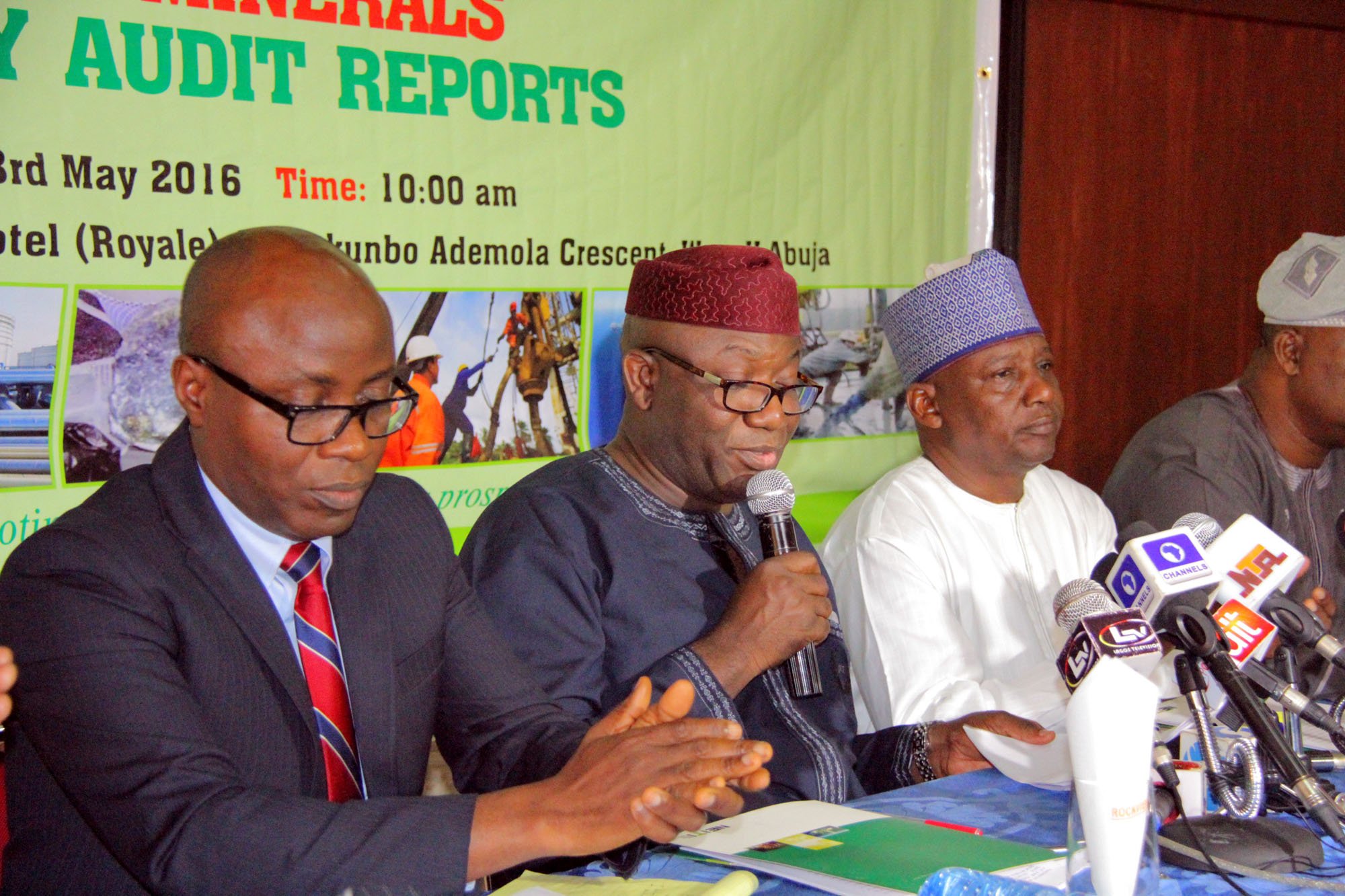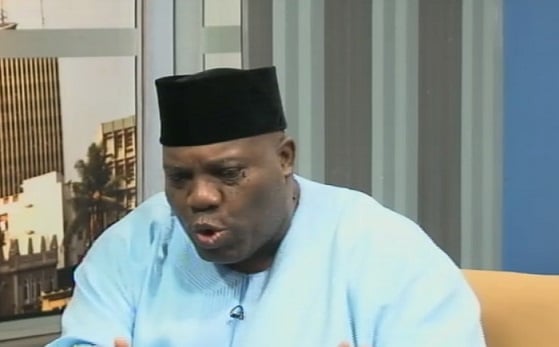It gives me great pleasure to welcome you all to this press conference. This event, as you know, was convened to present to the public the reports of the 2013 oil & gas and solid minerals audits, commissioned by NEITI. Going by the standards of the Extractive Industries Transparency Initiative (EITI), the 2013 reports should have been released latest by December 2015.
NEITI was set to meet this deadline, as it had always done since 2004 when Nigeria signed on to the global initiative for promoting transparency and accountability in the management of revenues from the extractive sector. But you will all recall that the boards of all government agencies were dissolved on 16 July 2015. Even when the commissioned auditors were done with their work, the reports could not be released until reviewed and approved by the National Stakeholders Working Group (NSWG), which is the board of NEITI.
You will all recall that President Muhammadu Buhari reconstituted the NSWG in late February this year, and kindly asked me to lead it. The board has since swung into action, holding, among others, two board meetings and a board induction, desirous of not just clearing the backlog of outstanding obligations but also of repositioning NEITI for greater effectiveness. To be sure, NEITI has achieved a lot in the last 12 years, but there is still so much more to do, especially at a time when our country is at a critical intersection and the need to sustainably reform our extractive sector is not only intertwined with the three-point agenda of the President Buhari Administration but is also an urgent imperative. Without doubt, enthroning transparency and accountability in the management of our extractive sector has positive implications for poverty reduction, social harmony, economic growth, shared prosperity, good governance, democratic deepening and overall development of our country.
Immediately after reconstitution, the NSWG decided to prioritise the release the 2013 reports, not only to fulfill the EITI requirement but also to maximize the opportunity presented by the current policy thrust of the government to make the management of revenues from the extractive sectors more open to public scrutiny. The board is committed to the timely completion of future audit reports as this would enhance both the utility and the impact of our reports. We also intend to produce interim reports between the main reports to reflect the currency of issues arising from management of the extractive sector. The objective is to shorten the cycle of engagement with policy makers and the public, and thus increase the probability of remediation and, ultimately, of making natural resources work better for all Nigerians.
Advertisement
That said, I will now turn to the highlights of the 2013 audit reports.
Highlights of the 2013 Oil and Gas Audit
Forty-one oil and gas producing companies and sixteen government agencies participated in the 2013 audit. Major highlights of the audit include the following:
Crude Oil Production and Liftings
Advertisement
The report disclosed that the total crude oil production in 2013 was 800,488,000 barrels. This was made up of production from all sources and various agreements. However, the total volume of crude oil lifted through the different contract arrangements was 800,338,000 barrels. The difference of 150, 000 barrels is because not everything produced is always lifted.
Revenue Flows to the Federation
The total revenue flows to the Federation from all sources in 2013 came to $58.07billion. This included revenues from crude oil sales, taxes, royalties and other incomes. The revenues realized in 2013 represented a decline of 8% when compared with the $62.9 billion realized in 2012. This decline was attributed to the drop in oil and gas sales following divestment of Federation equity in some OMLs, crude losses as a result of destruction of production facilities, pipeline vandalization, and crude oil theft.
Outstanding Revenues, Financial Losses, and Underpayments
Advertisement
According to the audit, some revenues that should have gone to the Federation in 2013 were not made or lost due to a number of reasons. These revenues were broken down as follows:
- Sum of $8billion and N358.3billion as outstanding revenues from NNPC and its sub-units in 2013. These outstanding payments were due from unpaid consideration from the divested OMLs, cashcall refunds from NAPIMS, and NPDC liftings from NAOC JV etc.
- Sum of $5.966 billion and N20.4 billion as revenue losses to the Federation. These losses were due to Offshore Processing Agreement, crude swap, crude theft etc.
- Sum of $599.98 million as under-assessments/under-payments of petroleum profit taxes and royalties by oil and gas companies as a result of the use of different pricing methodology by the government and the companies because of absence a new fiscal regime.
Remittance of NLNG Dividends
The audit revealed that NLNG paid the sum of $1.289 billion as dividends, interest and loan repayment for 2013. NNPC acknowledged receipt of this amount but did not remit it to either the Federal Government or the Federation. Please note that the NLNG payment not remitted by NNPC is already captured under Item 1 in the preceding paragraph. However, it is important to also note that the 2013 figure brings to $12.9 billion the total NLNG payments received by NNPC between 2005 and 2013 but not remitted by NNPC to the Federal Government or the Federation.
Transfer of Federation Equity by NNPC to NPDC
Advertisement
Between 2010 and 2011, NNPC divested 55% Federation equity in eight OMLs from the Shell JV to its subsidiary, NPDC. The eight OMLs (4, 26, 30, 34, 38, 40, 41 & 42) were valued by DPR at $1.8 billion, out which only $100 million was paid in April 2014, leaving a balance of $1.7 billion. (This amount too is already captured in the paragraph before the last above.) Also, the audit discovered that NNPC assigned four OMLs (60, 61, 62 & 63) from the NAOC JV to NPDC in December 2012. No amount had been paid on these four OMLs as at the conclusion of the 2013 audit, neither was the value of the consideration stated in the deed of assignment. Meanwhile, NNPC lifted crude on behalf of NPDC (not the Federation) from these OMLs that were not fully paid for or were not even paid for at all. According to the audit report, no justification was provided by NNPC for these transactions except that it was within the powers of the Minister to do so to support NPDC to develop upstream capacity. The report further asserted that the assignments of these OMLs were not transparent and competitive.
Cash Call Payments on the ‘Divested’ OMLs
Advertisement
The audit disclosed that $536.92 million was paid in 2013 by NAPIMS for the four OMLs in NAOC JV that had already been assigned to NPDC since December 2012. In addition, the proceeds of the Crude Oil lifted by NNPC from the said OMLs were also paid into the account of NPDC. However, NAPIMS provided evidence of a refund of $389 million by NPDC in 2014, leaving an outstanding balance of $147.86 million. The refund was not paid by NAPIMS to the Federation. Similarly, the audit uncovered that cash calls were paid by NAPIMS on the assets divested to NPDC from the Shell JV. Refund of $35.12m was made on OML 42, but there is no evidence of transfer to the Federation. Review of NAPIMS documents also indicated request for outstanding refunds on OML 26 ($414m and N249m) and on OML 42 (N2.17 bn.) It is important to bear in mind that all these figures had been captured in the summary provided above.
Domestic Crude Allocation and OPA/SWAP Arrangements
Advertisement
The report underlined that the continuous allocation of 445,000 barrels per day to refineries was not beneficial to the Federation, because the refineries were operating at a capacity of about 24%. In order to meet the shortfall in product supply, NNPC introduced the Offshore Processing Arrangement (OPA) and Crude for Product Swap arrangement. The audit stated that these transactions were not cost-efficient as the value of the products received minus all the costs incurred was still less than the value of the original crude. The loss to the Federation incurred through OPA and SWAP came to $211.8 million and $306 million respectively, both totaling $518 million.
Fuel Subsidy Payments
Advertisement
According to the audit, N1.3 trillion was processed as subsidy payments for NNPC and the independent marketers in 2013.
Metering and Crude Measurement
The report revealed that no remarkable progress has been made on the implementation of enhanced measurement arrangements for both downstream and upstream hydrocarbon flows. The absence of metering and crude measurement has very serious implications for Federation revenues.
Crude Oil and Product Losses
The report put the total value of crude oil losses to the Federation, as reported by three JV companies, in 2013 at $4.7 billion. This represents an increase of 46% over that of 2012. For downstream, COMD records showed that out of 38.263 mbbls allocated to the refineries in 2013 for local refining, 2.401 mbbls were lost through theft and vandalism. The report noted that the integrity of the pipelines networks that supply products has been severely battered over the years from damages by vandals. Again it is important to note that the figures mentioned here had been captured in the summary above.
Pioneer Status
The audit submitted that granting of pioneer status to oil and gas companies has greatly undermined the optimal collection of revenues due from Petroleum Profit Tax (PPT). The legal framework governing pioneer status is a subsidiary legislation of the Company Income Tax Act (CITA). The CITA does not apply to oil and gas companies, as the oil and gas companies are taxed under PPT.
Other Key Findings
- There has been significant improvement in the response by companies to NEITI audit process.
- The reconciliation difference between what the companies paid and receipts by government agencies reduced from $46.976million in 2012 to $492, 000 in 2013. This 98% fall is attributable to improved record keeping by the entities.
- Gas flaring penalty reduced from $24.58million in 2012 to $18.475million in 2013, which represents 25% decrease. This is due to reduced gas flaring and increased gas utilization.
- Under assessments in royalty payments decreased from $465million (30 companies) in 2012 to $168.3million (16 companies) in 2013. This represents a decrease of 64%.
Recommendations
The oil and gas audit report made a number of recommendations, including the following:
- The Federal Government should conduct a comprehensive investigation into the divestments of Federation assets by NNPC to NPDC.
- A scientific technology such as finger-printing should be put in place to track Nigeria’s crude oil trade to check oil theft.
- The Federal Government should quickly resolve the issue of pricing methodology by enacting appropriate law to forestall under assessments of PPT/Royalty.
- NNPC and its sub-units should refund outstanding payments to the Federation.
- Gas should be invoiced in dollars, not Naira, to avoid exchange losses;
- NNPC should discontinue alternative importation arrangements and limit itself to export of crude and import of refined products;
- NNPC should abide by Federal Government Financial Regulations and always comply with the 90-day credit period;
- Pioneer status should not be granted to companies in the oil and gas sector, except a company is actually pioneering an aspect of the industry;
- Government should investigate the status of NLNG dividends;
- NNPC, DPR, FIRS, OAGF and CBN should prioritize fixing remedial issues identified in their operations.
Highlights of the Solid Minerals Audit Report
Six hundred and nineteen (619) entities made payments to the government in 2013, but the 2013 solid minerals audit reconciled payments by only 65 entities (63 companies and two buying centres) that made payments of N2 million and above. These 65 entities (10.5% of 619) accounted for 90.49% of the total payments for 2013. Six government agencies were covered by the audit. Major highlights of the solid minerals audit are as follows:
Revenue Flows to Government
A total of N33.86 billion accrued to the Federation from solid minerals sector in 2013. Out of this, payments from cement manufacturing companies accounted for N30.47 billion (89.98%); construction companies, N1.98 billion (5.83%); mining and quarrying companies, N1.42 billion (4.19%). The distribution of revenues among government agencies showed that N28.954 billion was collected by Federal Inland Revenue Service (FIRS); N1.343 billion, by Mines Inspectorate Department (MID), and N704 million by Mining Cadastre Office (MCO). Unilaterally disclosures by companies not reconciled in the audit scope came to N2.861 billion while N748 million was reported as unilateral disclosures by government entities. Revenues from solid minerals rose by 7.6% from N 31.5 billion in 2012 to N33.9 billion in 2013.
Production Figures
Total production across the solid minerals sector increased to 46,280,996 tons in 2013 as against 37,808,063 tons in 2012. This 19% increase was attributed to a 33% rise limestone production from 18 million tons in 2012 to 24 million tons in 2013. Also, solid minerals sector accounted for an average of 0.09% of total export earnings for the year 2013 compared to 0.02% for 2012, with lead ores accounting for over 50% of the value of all solid minerals sector exports for 2013.
Dominant Companies and States
The report revealed that payments from the solid minerals sector were not well dispersed. For example, five companies accounted for 93% of the reconciled payments. These were: Dangote Cement, 53%; WAPCO, 19%; Ashaka Cement, 10%; UNICEM, 7%; and CCNN, 4%. Also, five states accounted for 72% of the total payments for solid minerals in 2013. These were: Ogun State, 25%; Kogi, 20%; FCT, 14%, Cross River, 9%; and Oyo, 4%.
Other highlights of the 2013 solid minerals audit report include:
- Lack of clarity on legal and tax regime;
- Inaccuracy of production data;
- Absence of transfer to states and local government areas;
- Inaction on previous audit reports.
Recommendations
The solid minerals audit report recommends the following:
- Government should develop procedures and systems to collect and verify production data declared by companies;
- Government should review the tax reporting system and put in place a sector-specific fiscal regime for the country. This will improve controls over sector revenues, transparency and traceability of income.
- The N2 billion that accrued from the solid minerals sector in 2013 should be shared to states in accordance with Section 1 of the Federation Accounts Act 1982 and the 13% derivation formula;
- There should be greater synergy between government agencies to ensure that mineral exports are properly taxed, authorized and captured;
- The Inter Ministerial Task Team (IMTT) should develop a clear action-plan for implementing audit recommendations;
- Nigeria should take advantage of the huge opportunities for jobs, growth and diversification offered by the solid minerals sector.
Details of the comprehensive findings and recommendations of the oil and gas and solid minerals audit reports are available on the NEITI website: www.neiti.org.ng.
Conclusion
It is important to re-state that these reports covered the year 2013. Clearly, a few things have or could have changed since then. But it is clear that despite the gap of three years, most of the issues raised in the two reports summarized above are still relevant today and should guide us on the way forward. As the Minister of Solid Minerals Development, I can assure you that most of the concerns relating to the solid minerals sector have been factored into the sector roadmap, which we launched recently and which we are already implementing. We are also all aware about the ongoing reforms in NNPC and in the oil sector in general. These reports reinforce why such reforms are so important and why we cannot afford to take our eyes off the ball.
Now that these reports are out, I will like to call on the legislature to take keen interest in the audit findings in designing legislations for the extractive sector and in carrying out their oversight functions. In the same vein, I want to call on the media, civic groups and citizens at large to carefully study the reports and use the information and data from them to trigger evidence-led and informed debates, strengthen the demand for holistic reforms, and hold governments and companies to account.
Over the years, NEITI has provided vital data on revenues, volume and governance processes in the extractive sector. However, the challenge has always been in getting accountability actors, especially citizens and civic groups, to use such critical evidence to hold to account those who exercise power in trust for them and to make effective demand for a better society. Merely publishing information about the extractive sector will not do the trick. Critical actors, especially citizens and civic groups, have to do their parts. This is why the focus of the new NSWG is to scale up our work with critical stakeholders on both the supply and the demand sides to increase the chances of sustainable reforms in a sector that is still the backbone of our economy and our lives.
Apart from making our reports more timely, more responsive and more relevant as I mentioned at the beginning, we intend to broaden our stakeholders’ engagement, widen our dissemination platforms, make our organization more fit-for-purpose, and create more avenues for directly impacting policy change. The recently introduced NEITI Policy Brief is consistent with this new direction and it is, in fact, an important marker of the path we intend to travel. In addition, we are keen on pushing the boundaries of transparency and accountability by expanding our focus into areas such as contracts transparency, commodity trading, beneficial ownership disclosure and the Open Government Partnership, which President Buhari committed Nigeria to at the recent London Anti-Corruption Summit. Ladies and Gentlemen of the Press, I have no doubt you will actively walk with us in this journey for the ultimate benefit of the generality of Nigerians.
I thank you for your time and your kind attention.
Being the text of an address by Kayode Fayemi, Phd, chairman of NSWG, at the press conference on the release of NEITI’s 2013 audit reports, held on May 2016 in Abuja







